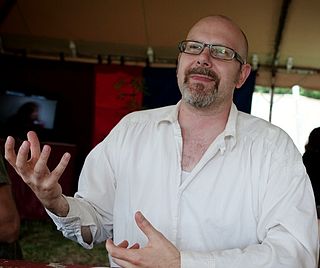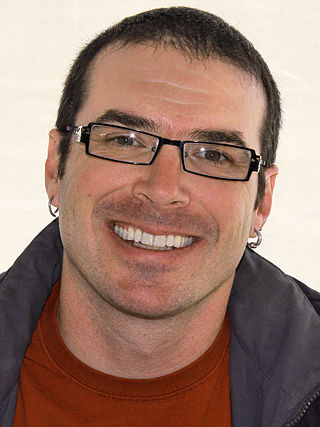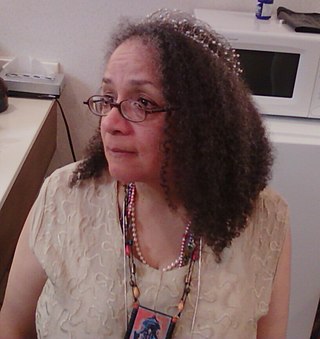Related Research Articles

Theodore Sturgeon was an American fiction author of primarily fantasy, science fiction, and horror, as well as a critic. He wrote approximately 400 reviews and more than 120 short stories, 11 novels, and several scripts for Star Trek: The Original Series.

The John W. Campbell Memorial Award for Best Science Fiction Novel, or Campbell Memorial Award, was an annual award presented to the author of the best science fiction novel published in English in the preceding calendar year. It was given by several organizations from 1973-1979 and then by the Center for the Study of Science Fiction at the University of Kansas until 2019. It is the novel counterpart of the Theodore Sturgeon Award for best short story, awarded at the same conference by the Theodore Sturgeon Literary Trust. The award is named in honor of John W. Campbell (1910–1971), whose science fiction writing and role as editor of Analog Science Fiction and Fact made him one of the most influential editors in the early history of science fiction. The award was established in 1973 by writers and critics Harry Harrison and Brian Aldiss "as a way of continuing his efforts to encourage writers to produce their best possible work." Locus magazine has listed it as one of the "major awards" of written science fiction.

Ted Chiang is an American science fiction writer. His work has won four Nebula awards, four Hugo awards, the John W. Campbell Award for Best New Writer, and six Locus awards. His short story "Story of Your Life" was the basis of the film Arrival (2016). He was an artist in residence at the University of Notre Dame in 2020–2021.

James Edwin Gunn was an American science fiction writer, editor, scholar, and anthologist. His work as an editor of anthologies includes the six-volume Road to Science Fiction series. He won the Hugo Award for "Best Related Work" in 1983 and he won or was nominated for several other awards for his non-fiction works in the field of science fiction studies. The Science Fiction and Fantasy Writers of America made him its 24th Grand Master in 2007, and he was inducted by the Science Fiction and Fantasy Hall of Fame in 2015. His novel The Immortals was adapted into a 1970–71 TV series starring Christopher George.

John Joseph Vincent Kessel is an American author of science fiction and fantasy. He is a prolific short story writer, and the author of four solo novels, Good News From Outer Space (1989), Corrupting Dr. Nice (1997), The Moon and the Other (2017), and Pride and Prometheus (2018), and one novel, Freedom Beach (1985) in collaboration with his friend James Patrick Kelly. Kessel is married to author Therese Anne Fowler.

Nancy Anne Kress is an American science fiction writer. She began writing in 1976 but has achieved her greatest notice since the publication of her Hugo- and Nebula-winning 1991 novella Beggars in Spain, which became a novel in 1993. She also won the Nebula Award for Best Novella in 2013 for After the Fall, Before the Fall, During the Fall, and in 2015 for Yesterday's Kin. In addition to her novels, Kress has written numerous short stories and is a regular columnist for Writer's Digest. She is a regular at Clarion writing workshops. During the winter of 2008/09, Nancy Kress was the Picador Guest Professor for Literature at the University of Leipzig's Institute for American Studies in Leipzig, Germany.

Nalo Hopkinson is a Jamaican-born Canadian speculative fiction writer and editor. Her novels and short stories such as those in her collection Skin Folk often draw on Caribbean history and language, and its traditions of oral and written storytelling.
Bradley Clayton Denton is an American science fiction author. He has also written other types of fiction, such as the black comedy of his novel Blackburn, about a sympathetic serial killer.

Annalee Newitz is an American journalist, editor, and author of both fiction and nonfiction, who has written for the periodicals Popular Science and Wired. From 1999 to 2008 Newitz wrote a syndicated weekly column called Techsploitation, and from 2000 to 2004 was the culture editor of the San Francisco Bay Guardian. In 2004 Newitz became a policy analyst at the Electronic Frontier Foundation. With Charlie Jane Anders, they also co-founded Other magazine, a periodical that ran from 2002 to 2007. From 2008 to 2015 Newitz was editor-in-chief of Gawker-owned media venture io9, and subsequently its direct descendant Gizmodo, Gawker's design and technology blog. As of 2019, Newitz is a contributing opinion writer at The New York Times.
The Theodore Sturgeon Memorial Award is an annual literary award presented by the Theodore Sturgeon Literary Trust and the Center for the Study of Science Fiction at the University of Kansas to the author of the best short science fiction story published in English in the preceding calendar year. It is the short fiction counterpart of the John W. Campbell Memorial Award for Best Science Fiction Novel, which was awarded until 2020 by the Center at the same conference. The award is named in honor of Theodore Sturgeon, one of the leading authors of the Golden Age of Science Fiction from 1939 to 1950. The award was established in 1987 by his heirs—including his widow, Jayne Sturgeon—and James Gunn, at the time the Director of the Center for the Study of Science Fiction.

Christopher McKitterick is an American writer of science fiction, educator, and academic concerned with the field. He is director of the Ad Astra Institute for Science Fiction & the Imagination, staff of the University of Kansas Achievement & Assessment Institute, director of the Ad Astra Center for Science Fiction and the Speculative Imagination, and was the long-time director of James E. Gunn's original Center for the Study of Science Fiction, serving the organization from 1992 until 2022. These programs support lectures, classes, master classes, workshops, awards, conferences, and educational-outreach resources for teachers, writers, and readers of science fiction.

Christopher Brown is an American author, who formerly wrote under the name Chris Nakashima-Brown, and is known for writing science fiction.

Paolo Tadini Bacigalupi is an American science fiction and fantasy writer. He has won the Hugo, Nebula, John W. Campbell, Compton Crook, Theodore Sturgeon, and Michael L. Printz awards, and has been nominated for the National Book Award. His fiction has appeared in The Magazine of Fantasy & Science Fiction, Asimov's Science Fiction, and the environmental journal High Country News. Nonfiction essays of his have appeared in Salon.com and High Country News, and have been syndicated in newspapers, including the Idaho Statesman, the Albuquerque Journal, and the Salt Lake Tribune.

Charlie Jane Anders is an American writer and commentator. She has written several novels, published magazines and websites, and hosted podcasts. In 2005, she received the Lambda Literary Award for work in the transgender category, and in 2009, the Emperor Norton Award. Her 2011 novelette Six Months, Three Days won the 2012 Hugo and was a finalist for the Nebula and Theodore Sturgeon Awards. Her 2016 novel All the Birds in the Sky was listed No. 5 on Time magazine's "Top 10 Novels" of 2016, won the 2017 Nebula Award for Best Novel, the 2017 Crawford Award, and the 2017 Locus Award for Best Fantasy Novel; it was also a finalist for the 2017 Hugo Award for Best Novel.

Vylar Kaftan is an American science fiction and fantasy writer. A Clarion West Workshop graduate, she lives on the U.S. West Coast.

Nisi Shawl is an African-American writer, editor, and journalist. They are best known as an author of science fiction and fantasy short stories who writes and teaches about how fantastic fiction might reflect real-world diversity of gender, sexual orientation, race, colonialism, physical ability, age, and other sociocultural factors.

David Walton is an American science fiction and fantasy writer living in Philadelphia. His novel Terminal Mind won the 2008 Philip K. Dick Award for the best paperback science fiction novel published in the United States, in a tie with Adam-Troy Castro's novel Emissaries from the Dead.
Rachel Swirsky is an American literary, speculative fiction and fantasy writer, poet, and editor living in Oregon. She was the founding editor of the PodCastle podcast and served as editor from 2008 to 2010. She served as vice president of the Science Fiction and Fantasy Writers of America in 2013.

Sam J. Miller is an American science fiction, fantasy and horror short fiction author. His stories have appeared in publications such as Clarkesworld, Asimov's Science Fiction, and Lightspeed, along with over 15 "year's best" story collections. He was finalist for multiple Nebula Awards along with the World Fantasy and Theodore Sturgeon Memorial Awards. He won the 2013 Shirley Jackson Award for his short story "57 Reasons for the Slate Quarry Suicides." His debut novel, The Art of Starving, was published in 2017 and his novel Blackfish City won the 2019 John W. Campbell Memorial Award.
"The Wedding Album" is a science fiction short story by David Marusek. It was first published in Asimov's Science Fiction in June 1999.
References
- ↑ "SFWA Grand Master Award". Archived from the original on August 22, 2019. Retrieved June 7, 2020.
- ↑ "James Gunn". Archived from the original on June 8, 2020. Retrieved June 7, 2020.
- ↑ "Giselle Anatol". Archived from the original on June 29, 2022. Retrieved May 5, 2022.
- ↑ Woodward, George (January 10, 1983). "Official letter from Associate Vice Chancellor George Woodyard to Professor Jim Gunn announcing the Board of Regents decision to establish the Center" (JPG). Office of the Vice Chancellor for Research, Graduate Studies, and Public Service (Original letter held in the KU Spencer Research Library). Lawrence, Kansas 66045: University of Kansas. p. 1. Archived from the original on March 14, 2023. Retrieved March 14, 2023.
{{cite news}}: CS1 maint: location (link) - ↑ Top Gunn: Renowned science fiction author finds fresh ways to cultivate genre Archived September 19, 2017, at the Wayback Machine , Lawrence Journal-World, April 11, 2008
- ↑ "Mission and History". Archived from the original on January 8, 2023. Retrieved March 17, 2023.
- ↑ "The Golden Age of Science Fiction: The 1973 John W. Campbell Memorial Award: Beyond Apollo, by Barry N. Malzberg (plus Special Award to Robert Silverberg for Dying Inside)". blackgate.com. Archived from the original on June 8, 2020. Retrieved June 7, 2020.
- ↑ "The Gunn Center Makes a Change, and Further Thoughts on the Reassessment of John W. Campbell". whatever.scalzi.com. Archived from the original on June 8, 2020. Retrieved June 7, 2020.
- ↑ "The Theodore Sturgeon Award". web.archive.org. March 14, 2023. Archived from the original on March 14, 2023. Retrieved March 14, 2023.
{{cite web}}: CS1 maint: bot: original URL status unknown (link) - ↑ "KU Center for the Study of Science Fiction News and Events". Archived from the original on June 30, 2020. Retrieved June 7, 2020.
- ↑ "Ad Astra SF Institute - workshops, classes, and more". Ad Astra Institute for Science Fiction & the Speculative Imagination. Archived from the original on March 14, 2023. Retrieved March 19, 2023.
- ↑ "CSSF Resource Center". sfcenter.ku.edu. Archived from the original on September 2, 2018. Retrieved August 31, 2018.
- ↑ "Latha Nair and James Gunn Centre Kerala". Archived from the original on June 8, 2020. Retrieved June 7, 2020.
- ↑ "archive - James E. and Jane F. Gunn Professorship in Science Fiction". web.archive.org. March 14, 2023. Archived from the original on March 14, 2023. Retrieved March 14, 2023.
{{cite web}}: CS1 maint: bot: original URL status unknown (link) - ↑ "Ad Astra SF Institute". Ad Astra Institute for Science Fiction and the Speculative Imagination. Archived from the original on March 14, 2023. Retrieved March 19, 2023.
- ↑ "Archived copy". Archived from the original on January 8, 2023. Retrieved March 16, 2023.
{{cite web}}: CS1 maint: archived copy as title (link) - ↑ "Theodore Sturgeon Memorial Award". Archived from the original on May 13, 2022. Retrieved May 5, 2022.
- ↑ "archive - Science Fiction Awards, Student Work, and Scholarships". Archive - Gunn Center for the Study of Science Fiction. Archived from the original on March 19, 2023. Retrieved March 19, 2023.
- ↑ "Gunn Award". Archived from the original on March 16, 2023. Retrieved March 17, 2023.
- ↑ "John W. Campbell Memorial Award". Archived from the original on December 29, 2012. Retrieved June 7, 2020.
- ↑ "Scholarship in Science Fiction Studies". Archived from the original on June 30, 2020. Retrieved June 7, 2020.
- ↑ "Silver Lining Award". Archived from the original on June 30, 2020. Retrieved June 7, 2020.
- ↑ "Mark Bourne Speculative Fiction Writing Scholarship". Archived from the original on January 14, 2020. Retrieved June 7, 2020.
- ↑ "Campbell Conference page". Archived from the original on March 14, 2023. Retrieved March 17, 2023.
- ↑ "John W. Campbell and Theodore Sturgeon Award Trophies". Campbell and Sturgeon Award Trophies. Archived from the original on March 18, 2023. Retrieved March 18, 2023.
- ↑ "Theodore Sturgeon Memorial Award". Archived from the original on January 8, 2023. Retrieved March 16, 2023.
- ↑ "Sturgeon Symposium". Archived from the original on March 15, 2023. Retrieved March 16, 2023.
- ↑ "Ad Astra SF Institute - workshops, classes, and more". Ad Astra Institute for Science Fiction and the Speculative Imagination. Archived from the original on March 14, 2023. Retrieved March 19, 2023.
- ↑ "Novel Architects Speculative Fiction Writing Workshop". Ad Astra Institute for Science Fiction and the Speculative Imagination website. Archived from the original on March 14, 2023. Retrieved March 19, 2023.
- ↑ "Young Adult Novel Writing Workshop". sfcenter.ku.edu. Archived from the original on May 8, 2020. Retrieved June 7, 2020.
- ↑ "Science, Technology, and Society: Examining the Future Through a Science-Fiction Lens". Archived from the original on March 19, 2023. Retrieved March 17, 2023.
- ↑ "Intensive Institute on Science Fiction Literature". Ad Astra Institute for Science Fiction and the Speculative Imagination. Archived from the original on March 14, 2023. Retrieved March 14, 2023.
- ↑ "Science Fiction and the Popular Media". Ad Astra Institute for Science Fiction and the Speculative Imagination. Archived from the original on March 14, 2023. Retrieved March 14, 2023.
- ↑ "SF Courses". Archived from the original on March 14, 2023. Retrieved March 1, 2022.
- ↑ "CSSF Course Offerings". Archived from the original on February 19, 2022. Retrieved March 1, 2022.
- ↑ AboutSF Archived March 9, 2013, at the Wayback Machine
- ↑ About Us Archived June 11, 2013, at the Wayback Machine
- ↑ Teaching SF: A Workshop for Teachers, Librarians and Parents Archived August 20, 2013, at the Wayback Machine
- ↑ "James Gunn's Ad Astra". James Gunn's Ad Astra. Archived from the original on March 17, 2023. Retrieved March 17, 2023.
- ↑ "CSSF Staff". Archive of the Gunn Center for the Study of Science Fiction. Archived from the original on March 14, 2023. Retrieved March 19, 2023.
- ↑ "Affiliate Faculty". Archived from the original on January 8, 2023. Retrieved March 14, 2023.